Math games with a deck of cards offer an engaging way to practice arithmetic operations, probability, and strategy. Simple to set up, they suit all skill levels and age groups, enhancing problem-solving and mental math abilities while fostering healthy competition and teamwork.
Overview of the Topic
Math games using a deck of cards are a versatile and engaging way to practice various mathematical operations, from basic arithmetic to advanced concepts like probability and algebra. These games are ideal for learners of all ages, as they combine fun and strategy with skill development. A standard deck of cards is typically used, with face cards assigned specific values (e.g., Jacks as 11, Queens as 12, and Kings as 13), while Aces are often worth 1. Players can enjoy games like Math War, Multiplication War, and Pyramid, which focus on operations such as addition, subtraction, multiplication, and division. These activities not only enhance problem-solving skills but also promote mental math fluency and critical thinking. PDF guides and downloadable resources are widely available, offering detailed rules and variations for educators and families to customize games for different skill levels and group sizes.
Importance of Using Playing Cards for Math
Using playing cards for math is a versatile and effective way to engage learners in hands-on practice. Cards provide a tangible tool for understanding numerical relationships, making abstract concepts more concrete. They cater to various learning styles, enhancing problem-solving, mental math, and critical thinking skills. Playing cards are accessible, inexpensive, and easy to use, making them ideal for classrooms, homeschooling, or family activities. They also encourage active participation and healthy competition, fostering a positive attitude toward math. With their flexibility, card games can be adapted to suit different skill levels, making them a valuable resource for learners of all ages. PDF guides offer a wealth of creative and structured activities to maximize learning outcomes.
How to Get Started with Math Card Games
Getting started with math card games is simple and requires minimal preparation. Begin by gathering a standard deck of playing cards, removing face cards and jokers to focus on numerical values. Assign values to the remaining cards, with Aces typically worth 1 and numbered cards representing their face value. Choose a game based on the skill level of the players, such as addition or multiplication war for beginners. Shuffle the deck and deal the cards evenly among players. Explain the rules clearly and demonstrate gameplay with a practice round. Encourage players to ask questions and ensure understanding before starting. This approach ensures a smooth and engaging introduction to math card games, fostering learning and enjoyment for all participants.
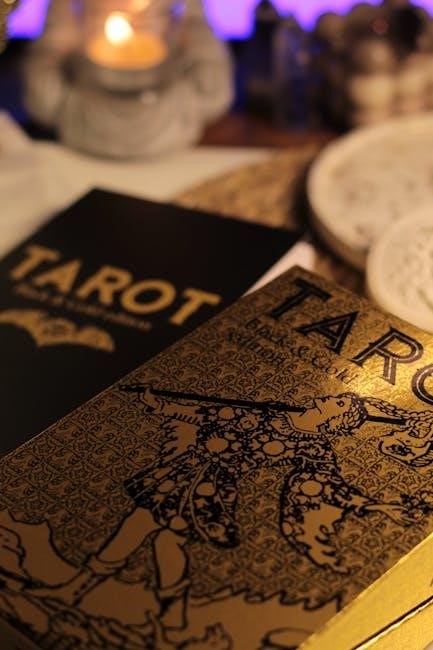
Popular Math Games Using a Deck of Cards
Explore popular math games like Math War, Multiplication War, and Pyramid. These engaging activities transform a deck of cards into a tool for practicing arithmetic, strategy, and critical thinking, suitable for all skill levels.
Math War: Rules and Gameplay
Math War is a classic card game that turns math practice into a fun competition. Players split a standard deck of 52 cards evenly, removing face cards and jokers. Each player flips two cards, adds, subtracts, multiplies, or divides the values to determine the winner. The player with the highest result collects all four cards. For advanced players, two cards can form a two-digit number to increase difficulty. The game continues until one player has all the cards, making them the winner. Variations include using three cards for addition or focusing on specific operations like multiplication. Math War sharpens math fluency and strategic thinking through engaging gameplay.
Multiplication War: A Fun Twist on a Classic Game
Multiplication War is a dynamic variation of the classic card game, designed to practice multiplication facts. Players use a standard deck of 52 cards, removing face cards and jokers. Each player flips two cards, multiplies the values, and the highest product wins the round. The winner collects all four cards. To increase difficulty, players can form two-digit numbers with their cards for more complex calculations. This game is ideal for reinforcing multiplication fluency and mental math skills. Its competitive nature makes learning enjoyable and engaging, while the simplicity of the setup ensures it can be played anywhere. Multiplication War is a great way to build confidence and mastery of multiplication tables.
Addition and Subtraction Games for Beginners
Addition and subtraction games using a deck of cards are perfect for young learners. Start by removing face cards and jokers, using only numbered cards. Each player draws two cards, adds or subtracts the values, and the highest result wins the round. For example, a player with cards 5 and 3 in an addition game would have 8. To make it easier, focus on positive answers for subtraction. These games help build foundational math skills in a fun, interactive way, encouraging quick mental calculations and healthy competition. They are ideal for elementary students, making math practice both accessible and enjoyable while developing problem-solving abilities from an early age. These games lay a strong foundation for more complex math concepts.
Pyramid: A Math Card Game to Make Ten
Pyramid is a simple yet engaging math card game designed to practice making ten. Begin by removing face cards and jokers, using only numbered cards (Aces worth 1). Arrange the deck into a pyramid structure with four rows. Players take turns drawing two cards from the bottom row, trying to add them to reach ten. If they succeed, they keep the cards; otherwise, they are discarded. The goal is to collect the most pairs that sum to ten. This game improves addition skills, problem-solving, and strategic thinking, making it ideal for beginners and younger students. It’s a fun way to build foundational math skills through interactive play.
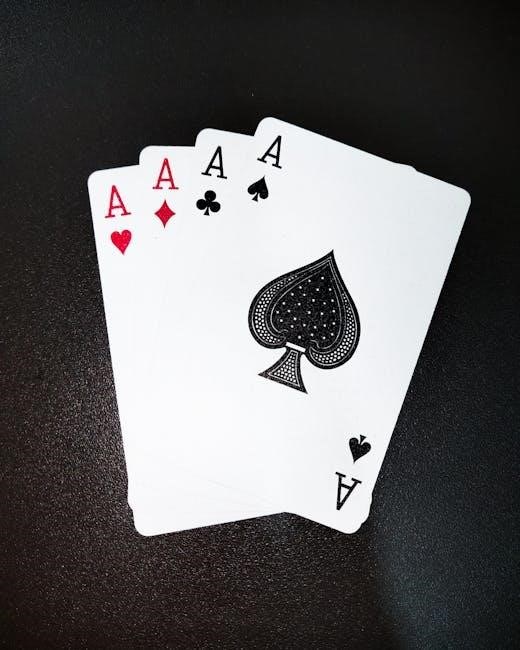
Setup and Materials for Math Card Games
A standard deck of 52 cards is essential, with face cards and jokers often removed. Assign values: Aces as 1, numbered cards as shown, and face cards as 10. Simple setup makes these games accessible for all skill levels, ensuring an engaging math practice experience.
Materials Needed: Deck of Cards and Accessories
A standard deck of 52 playing cards is the primary material needed for most math card games. Face cards (Jacks, Queens, Kings) and Jokers are often removed, while Aces are typically assigned a value of 1. Numbered cards retain their face value, and face cards can be valued at 10 for simplicity. Additional accessories like dice, tokens, or paper or pencils for scoring may enhance gameplay. For advanced games, multiple decks or specialized cards (e.g., Uno cards) can be used. Educators and parents can easily source these materials, as decks are widely available at low cost or already present in most households. This accessibility makes math card games a practical tool for learning.
Preparing the Deck: Removing Face Cards and Jokers
To prepare a deck for math games, start by removing face cards (Jacks, Queens, Kings) and Jokers, as they are typically not used in numerical games. Aces are usually assigned a value of 1, while numbered cards retain their face value. For simplicity, face cards can be valued at 10 if they are included. Some games may also require removing specific cards, like 6s, 7s, 8s, 9s, or 10s, to focus on lower or higher numbers. This customization ensures the deck aligns with the game’s objectives and skill level. Proper preparation makes gameplay smoother and more focused on the intended math concepts.
Assigning Values to Cards: Aces, Numbers, and Face Cards
In math card games, assigning values is crucial for gameplay. Aces are typically valued at 1, while numbered cards retain their face value. Face cards (Jacks, Queens, Kings) are often assigned a value of 10, though they can be removed for simpler games. Jokers are usually excluded or given a unique value. For advanced play, face cards may represent higher values or specific math challenges. Customizing card values allows games to cater to different skill levels, ensuring players can practice addition, subtraction, multiplication, or division effectively. This flexibility makes card games adaptable for various educational needs and age groups.
Customizing Games for Different Skill Levels
Customizing math card games allows players of all skill levels to engage effectively. For beginners, simplify by using fewer cards or focusing on basic operations like addition and subtraction. Intermediate players can incorporate multiplication and division, while advanced learners can tackle complex problems or multi-digit calculations. Adjusting the number of cards drawn or the operations required helps tailor the difficulty. Adding challenges, such as forming two-digit numbers or applying place value, enhances complexity. This flexibility ensures games remain fun and educational for all ages, catering to individual learning needs and promoting progression in math fluency. Customization keeps the games dynamic and inclusive.

Math Operations with Playing Cards
Playing cards provide a versatile tool for practicing addition, subtraction, multiplication, and division. Each operation can be explored through various card games, making math engaging and accessible for all skill levels.
Addition Games: Summing Card Values
Addition games with playing cards are a fantastic way to practice summing numbers. Players draw cards, add their values, and the highest sum wins. For simplicity, use numbered cards only, with Aces worth 1. To make it more challenging, include face cards (Jacks as 11, Queens as 12, Kings as 13). Games like “Addition War” involve turning over two cards, adding them, and the player with the larger sum claiming all cards. Variations include adding three or more cards for advanced players or adding zeros to answers for place value practice. These games enhance arithmetic fluency and problem-solving skills while fostering healthy competition. They are ideal for all ages and skill levels.
Subtraction Games: Subtracting Card Values
Subtraction games with playing cards are an effective way to practice subtracting numbers. Players draw cards, subtract the smaller value from the larger one, and the highest result determines the winner. For simplicity, use numbered cards only, with Aces valued at 1. To add complexity, include face cards (Jacks as 11, Queens as 12, Kings as 13). Games like “Subtraction Showdown” involve turning over two cards, subtracting the smaller from the larger, and the player with the highest difference claiming all cards. Variations include subtracting three-card totals or creating two-digit numbers for advanced challenges. These activities enhance mental math and strategic thinking while keeping players engaged and competitive.
Multiplication Games: Multiplying Card Values
Multiplication games with a deck of cards are an excellent way to practice multiplication facts. Players draw cards, multiply the values, and the highest product wins the round. For example, in “Multiplication War,” each player flips two cards, multiplies them, and the player with the larger product takes all cards; Face cards can be assigned values (Jack=11, Queen=12, King=13) to increase difficulty. Advanced variations include using three cards or forming two-digit numbers for more complex calculations. These games not only reinforce multiplication skills but also enhance mental math and strategic thinking, making them a fun and interactive learning tool for students of all ages.
Division Games: Dividing Card Values
Division games with a deck of cards provide an interactive way to practice division skills. Players draw two cards, using one as the dividend and the other as the divisor, and calculate the result. The player with the correct answer takes both cards. For example, in “Division Showdown,” each player flips two cards, divides the first by the second, and the closest whole number wins. To increase difficulty, players can draw three cards, using two for division and the third as a multiplier. These games enhance understanding of division concepts, improve mental math, and encourage strategic thinking, making them a valuable tool for math practice and skill mastery.

Advanced Math Concepts with Cards
Explore probability, fractions, and algebra using cards. Calculate odds, create fractions with card values, and solve equations, making complex math engaging and accessible for deeper understanding.
Probability and Statistics: Calculating Odds
Using a deck of cards, students can explore probability and statistics through engaging games. Activities like “Probability War” involve calculating the likelihood of drawing specific cards, enhancing understanding of odds and chance. Players can compare probabilities, such as the chance of drawing a heart versus a spade, or predict outcomes based on card distributions. Games like “Multiplication Quick Draw” also incorporate probability by assigning numerical values to cards, allowing students to practice calculating odds in a fun, competitive environment. These exercises make abstract concepts tangible, fostering a deeper grasp of probability principles and their real-world applications.
Fractions and Decimals: Using Cards for Visual Learning
Playing cards provide a hands-on way to teach fractions and decimals, making abstract concepts more tangible. For example, dividing a deck into equal parts helps visualize fractions like halves or thirds. Assigning decimal values to cards, such as treating a “5” as 0.5 or 5.0, allows students to practice operations like addition and subtraction of decimals. Games like “Fraction Match” involve pairing cards to create equivalent fractions, while “Decimal Line-Up” challenges players to arrange cards in ascending or descending decimal order. These activities foster a deeper understanding of fractional and decimal relationships in an engaging, interactive manner.
Algebra: Solving Equations with Card Values
Playing cards can be used to create engaging algebra activities, helping students visualize and solve equations. Assign numerical values to cards, treating them as variables or coefficients. Players can draw cards to form equations, such as solving for ( x ) in ( 3x + 2 = 11 ). Games like “Equation Match” involve creating equivalent expressions or balancing equations. For advanced players, introduce negative numbers or multiple variables. This hands-on approach makes abstract algebraic concepts more accessible and fun, encouraging critical thinking and problem-solving while reinforcing mathematical principles in an interactive way.

Educational Benefits of Math Card Games
Math card games enhance problem-solving skills, improve mental math abilities, and foster critical thinking. They build confidence, encourage strategic planning, and make learning engaging and enjoyable for all ages.
Developing Problem-Solving Skills
Math card games foster problem-solving skills by encouraging players to think critically and strategically. Games like Math War and Multiplication War require quick mental calculations, helping players develop the ability to approach problems methodically. By forming two-digit numbers or adding multiple cards, players learn to break down complex problems into manageable parts. These activities also promote logical reasoning and adaptability, as players must adjust their strategies based on the cards they draw. Engaging in such games regularly enhances analytical thinking and prepares learners to tackle real-world challenges with confidence and creativity. This skill-building process makes math both enjoyable and intellectually stimulating for all participants.

Improving Mental Math Abilities
Engaging in math card games significantly enhances mental math abilities by fostering quick and accurate calculations. Games like Multiplication War and Addition War require players to rapidly compute sums or products of card values, sharpening their numerical fluency. Regular practice with these activities strengthens the ability to perform arithmetic operations effortlessly, even under time constraints. Players also develop a stronger number sense, which is crucial for tackling complex math problems. As learners progress, they can advance to more challenging variations, such as forming multi-digit numbers or solving basic algebraic equations. These exercises not only improve speed and accuracy but also build confidence in handling math challenges effectively.
Enhancing Critical Thinking and Strategy
Math card games foster critical thinking and strategic planning, encouraging players to make calculated decisions. Games like Pyramid and Solitaire require foresight and adaptability, as players must anticipate outcomes and adjust their moves accordingly. By evaluating card values and potential combinations, learners develop the ability to weigh risks and opportunities. These skills extend beyond the game, enhancing problem-solving abilities in real-world scenarios. Players learn to think ahead, prioritize actions, and optimize their chances of success. Strategic thinking becomes second nature, helping individuals approach challenges with a logical and methodical mindset. This mental agility is invaluable for academic and lifelong learning.
Building Confidence in Math
Engaging in math card games fosters confidence by making learning interactive and enjoyable. Players experience success through achievable challenges, reinforcing their math skills. Repetition and mastery of arithmetic operations build a strong foundation, reducing anxiety. The sense of accomplishment from winning or solving problems boosts self-esteem, encouraging learners to tackle more complex tasks. These games create a supportive environment where mistakes are part of the learning process, helping individuals develop resilience. As players progress, their confidence grows, translating to improved performance in academic settings and a more positive attitude toward mathematics. This empowerment is key to lifelong math proficiency and enthusiasm for learning.
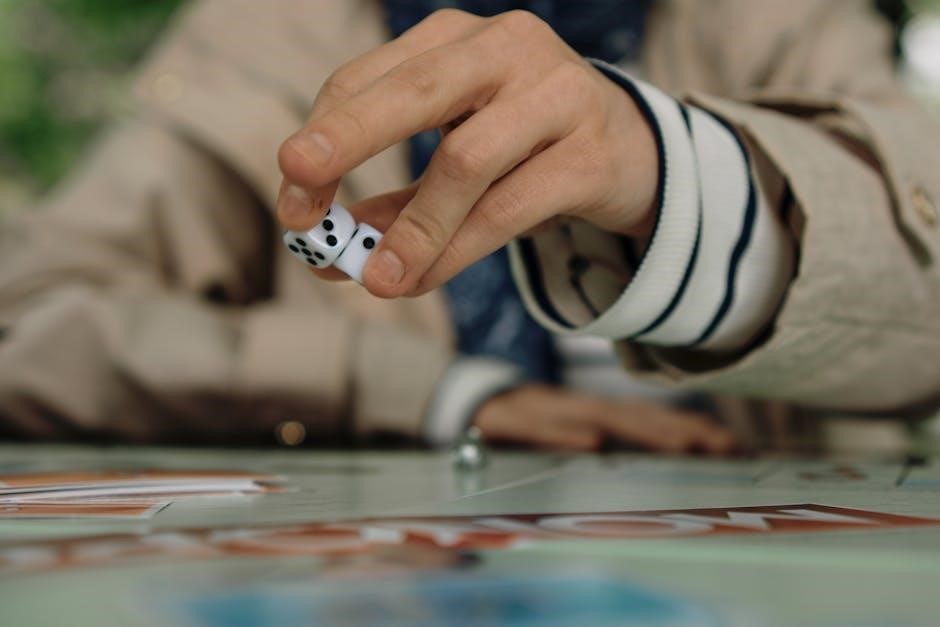
Math Card Games for Different Age Groups
Math card games are adaptable to various age groups, offering simplicity for young learners and complexity for teens, ensuring engaging math practice tailored to developmental stages.
Games for Elementary School Students
Elementary students can enjoy simple, engaging math games using a deck of cards. Games like “Math War” and “Pyramid” focus on basic addition, subtraction, and number recognition. These games are easy to understand and require minimal setup. For example, in “Math War,” students split the deck, flip cards, and add the numbers. The player with the higher sum wins the round. This game helps build mental math skills and introduces competition in a fun way. Another option is “Addition Bingo,” where cards are drawn and added to reach a target number. These activities are perfect for young learners, promoting number sense and confidence in math. They also encourage teamwork and strategy, making learning enjoyable and interactive.
Games for Middle School Students
Middle school students can engage in more complex card games that focus on multiplication, division, and advanced arithmetic. “Multiplication War” is a popular choice, where players flip two cards, multiply the numbers, and the highest product wins the round. For added challenge, students can form two-digit numbers or incorporate division for more variety. Another game, “Multiplication Quick Draw,” involves drawing cards and solving multiplication problems swiftly. These activities enhance mental math skills, introduce strategic thinking, and prepare students for higher-level math concepts. They are ideal for reinforcing math facts while fostering healthy competition and problem-solving abilities in a dynamic, interactive environment.
Games for High School Students
High school students can engage in advanced math games that focus on algebra, fractions, and probability. “Equation Showdown” involves drawing cards to create equations, with players comparing solutions to determine the winner. “Fraction Match” challenges students to form and simplify fractions using card values, enhancing numeracy skills. Another option is “Probability Poker,” where players calculate the likelihood of drawing specific cards. These games are designed to strengthen algebraic thinking, statistical reasoning, and problem-solving abilities. They also prepare students for standardized tests and real-world math applications, making learning engaging and intellectually stimulating while fostering critical thinking and strategic planning.
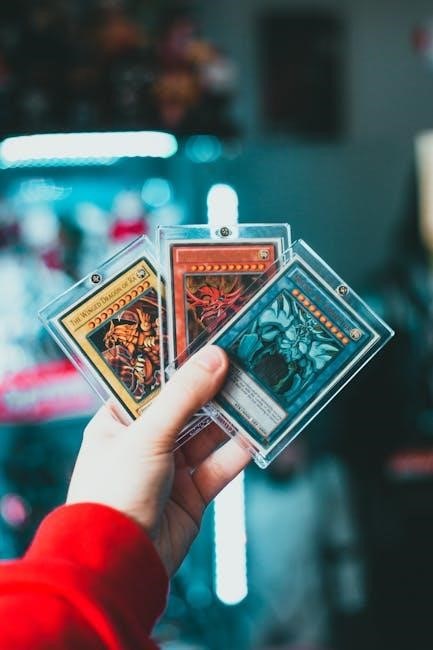
Math Card Games for Multiple Players
Engage groups of 3-4 players with games like “Pyramid” and “Multiplication Quick Draw,” fostering teamwork and strategic thinking while practicing math skills in a fun, competitive environment.
2-Player Games: Competitive and Fun
Two-player math card games are perfect for fostering competition and fun while sharpening math skills. Games like “Math War” and “Multiplication War” involve splitting a deck of cards, turning over pairs, and performing arithmetic operations to determine the winner. Players can add, subtract, or multiply card values, with the highest result claiming all cards. These games are simple to learn but strategically engaging, making them ideal for practicing mental math and fostering healthy rivalry. They also adapt to skill levels, allowing for variations like forming two-digit numbers or adding multiple cards. Such games are great for pairs looking to enjoy math practice in a lively, competitive setting.
3-4 Player Games: Teamwork and Strategy
Math card games for 3-4 players encourage teamwork, strategy, and social interaction while practicing math skills. Games like “Go Fish!” and “Spoons” can be adapted to include math challenges, where players collect sets or sequences of cards to solve problems. Team-based variations involve dividing players into groups to work on math tasks together, fostering collaboration and communication. These games also introduce strategic thinking, as players must decide when to take risks or play it safe. They are ideal for larger groups, promoting engagement and fun while reinforcing math concepts. Multiplayer games are versatile, suitable for both children and adults, and can be customized to suit different skill levels and objectives.
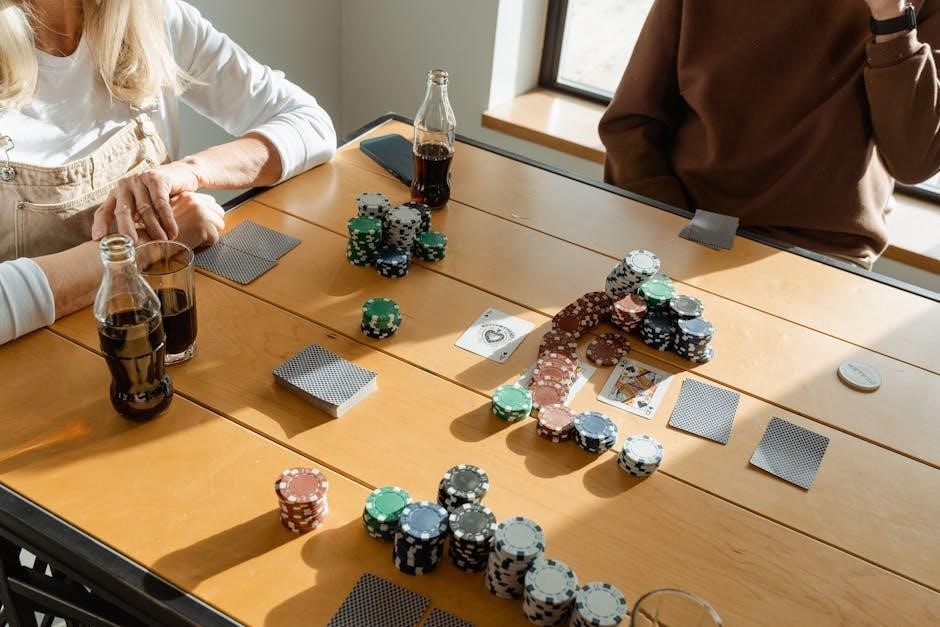
Resources and Downloads
Discover downloadable PDF guides, customizable templates, and rule sheets for math card games. Explore online communities and forums for sharing ideas and accessing free resources.
PDF Guides for Math Card Games
PDF guides for math card games provide comprehensive instructions and rules for various activities. These downloadable resources often include step-by-step setup, gameplay rules, and variations for different skill levels. Many guides feature customizable templates, allowing users to adapt games to suit specific learning needs. Examples include detailed rule sheets for games like Multiplication War and Pyramid, as well as tips for assigning card values and modifying difficulty. Some guides also offer printable materials, such as score tracking sheets and strategy cards. Whether you’re a teacher, parent, or student, these PDF guides are invaluable for organizing structured and engaging math activities. They make learning fun and accessible for everyone.
Downloadable Templates and Rule Sheets
Downloadable templates and rule sheets simplify the setup of math card games, providing clear instructions and structured formats. These resources often include pre-designed layouts for score tracking, game rules, and card value assignments; Printable templates allow users to create custom game materials, such as rule cards or player scorecards. Rule sheets detail step-by-step gameplay for popular games like Multiplication War and Pyramid, ensuring consistency and clarity. Many templates are adaptable, enabling users to adjust difficulty levels or incorporate specific math operations. These tools are ideal for educators and parents seeking organized, ready-to-use materials to make learning math engaging and efficient for students of all ages.
Online Communities for Math Card Game Enthusiasts
Online communities for math card game enthusiasts provide a vibrant space to share ideas, discover new games, and connect with fellow educators and learners. Platforms like Facebook groups, Reddit forums, and specialized math education websites host discussions on innovative card-based activities. These communities often feature user-generated content, including custom game designs and variations. Members can access shared resources, such as printable rule sheets and video tutorials, to enhance their gameplay. Additionally, these forums foster collaboration, allowing users to refine their creations and gain feedback. By joining these communities, enthusiasts can stay updated on the latest trends and inspire others with their passion for math card games.
Math games with a deck of cards are a fun, effective way to enhance math skills, encouraging problem-solving and mental math. Try them and share the joy of learning!
Final Thoughts on Math Card Games
Math card games are a versatile and engaging tool for learning, suitable for all age groups and skill levels. They foster problem-solving, mental math, and strategic thinking while making learning enjoyable. By incorporating creativity, such as combining operations or using jokers for challenges, these games can be adapted to meet diverse educational needs. Their accessibility with a simple deck of cards makes them ideal for classrooms, homes, or community groups. Educators and parents can leverage these games to create interactive lessons, ensuring math is both fun and impactful; Explore the provided PDF guides for inspiration and start playing today!
Encouragement to Try and Share Math Card Games
Math card games are a fun and effective way to make learning engaging for everyone. They are easy to set up, require minimal materials, and can be adapted to suit different age groups and skill levels. Whether you’re a parent, educator, or student, these games provide an interactive way to practice math concepts while fostering healthy competition and teamwork. Share these games with others to spread the joy of learning. Encourage friends, classmates, or colleagues to give them a try, and explore the variety of creative ideas available in math games with a deck of cards PDF guides. Start playing today and watch how math becomes an enjoyable and impactful experience for all!